
Stormy weather is helpful to turkey hunters
For a species with a brain the size of a walnut, wild turkeys are fairly clever at avoiding the talons or the teeth of predators, but their poor sense of smell allows hunters and other predators to take a few turkeys each year.
Turkeys rely on their super-keen vision and hearing to keep them safe, and they are masters most of the time. Yet Mother Nature gives them a tough hand to play during periods of stormy weather, when both their sights and hearing is compromised. Fortunately for hunters, this can be one of the best times to kill a turkey — especially on public lands.
As soon as a storm rolls in, most hunters will retreat to the protection of their vehicles and/or call it quits. For the public-land hunter willing to tough out the elements, the woods and fields are finally clear of competition and open to take down a tom.
Any turkey hunter who has ever hunted in the rain understands it can be tough hunting. To start with, turkeys don’t like stormy weather any more than hunters do, but they still have to eat and take care of business. Turkeys are on high alert during the rain and will be very watchful of anything that looks and sounds suspicious.
As a general rule, turkeys don’t talk much in the rain, so a repeated and aggressive sequence of calls on a rainy day will alert turkeys of danger. However, short calling sessions are not out of the question. When the rain is sporadic and light during the height of the breeding season, turkeys will continue to do their thing, which makes it okay for hunters to pull out their calls. But the less-aggressive caller will have a better chance of tagging a bird on poor-weather days.
Check fields and open areas during rain
Typically, turkeys will retreat in the rain, especially heavy rain, to open fields or open woodlands. Since they cannot hear well with rain falling, turkeys will gang up and get in a place where they can see well to spot any incoming predator. Hunters can take advantage to utilize their spot-and-stalk skills. It is probably the only time when hunters can stalk turkeys without being heard.
Harold Knight of Knight and Hale Game Calls loves hunting during thunderstorms.
“When a bad storm comes up, don’t leave. It is one of my favorite times to hunt turkeys,” he said. “Every turkey in the woods will respond to the thunder rumbling.”
Locating gobblers is sometimes the hardest part about turkey hunting. Let Mother Nature’s stormy weather give away their location.
“Sometimes the birds will respond better in poor weather, too,” Knight said.



